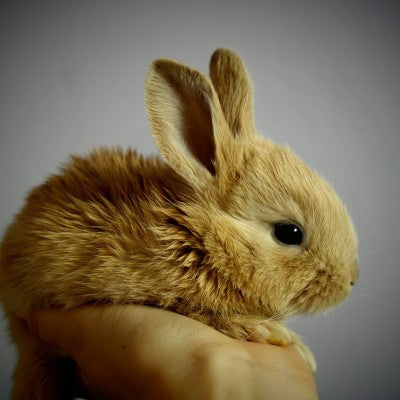
Beauty's ongoing battle with animal cruelty
“Every year, hundreds of thousands of animals around the world endure painful, frightening procedures at the hands of experimenters in the name of beauty,” says PETA Australia’s Campaign Coordinator, Claire Fryer.
Despite that animal testing is opposed by 85 percent of Australians and, that it is relatively unheard of in Australia, a number of unscrupulous companies still allow their products, or the ingredients they contain, to be tested on animals.
If you visit the websites of many big name brands you will find a detailed ‘no animal testing policy’ and messages opposing this cruel and senseless act. However, according to Ms Fryer, these companies are deceiving their costumers.
Even though animal testing is outdated and unnecessary, Government regulations in China still stipulate that the majority of cosmetic products must be tested on animals. This includes all products manufactured in other countries and imported to sell.
“MAC and parent company Estée Lauder put animals through painful and deadly toxicity tests in order to be able to sell their products in China, where nearly all cosmetics are required to be tested on animals.” claims Ms Fryer.
Though animal testing may not directly occur in Australia, these animal tested products make their way to our shores and are sold on our shelves. So it is reasonable to suspect that most Australia women are unaware how much of their ‘on fleek’ #MOFT (makeup of the day) they owe to the pain and suffering of countless creatures. But 8 out of 10 of Australia’s most popular cosmetics companies test their products on animals.
“Rats, mice, guinea pigs, rabbits and other animals are forced to endure the pain of having caustic chemicals applied to their sensitive eyes and skin,” says Ms Fryer, “MAC and Estée Lauder that are using these highly social animals as though they were disposable laboratory equipment.”
Thankfully, due to societal pressures and the fact that results derived from animal testing are unreliable and often not applicable to humans, science has developed alternative methods to animal testing. These methods are not only proven to be more accurate, more timely and more cost effective, but also generate products which are safer and more effective for human use.
“Instead of measuring how long it takes a chemical to burn the cornea of a rabbit’s eye, manufacturers can now drop that chemical onto cornea-like 3-D tissue structures produced from human cells. Likewise, human skin cultures can be grown and purchased for skin irritation testing,” says Ms Fryer.
However, regardless of these scientific advances, there are only four countries in the entire world where cosmetic testing on animals has been banned. And only recently, Australia is becoming one of them.
“In some cases, botulinum products, such as Botox and Dysport, are not included in the ban because they do not fall under the definition of cosmetics,” says Ms Fryer,“Tests for these products by companies, such as Ipsen, Merz and Eisai, involve injecting groups of mice in their abdomens and observing as they become paralysed and eventually suffocate to death.”
A matter of chemical clarification allows for these tests, which are specially designed to observe how many mice die after being injected with toxic substances. Botox testing is responsible for the death and horrendous treatment of estimated 300,000 mice per year.
The easiest way to take a stand against cosmetic animal testing is to simply buy certified vegan and cruelty free brands. However, a heard of dishonest companies and flocks of misleading information, makes this simple solution a not so simple task.
The Leaping Bunny is one-third party certification that guarantees your products are entirely cruelty free. Beyond this researching what brands are readily available in countries such as China and Brazil can help to ensure you are not purchasing animal tested products.
On the surface consumers could be lured into believing that the Australian market does well to provide plenty of cruelty-free options. While this may be the case, we, as a country have a long way to go in stomping out the horrific and unnecessary suffering of our four legged friends, and as a consumer, you have this power.
Authored by: Kaitlyn Wilson
Want to write for us? Contact us to be a Williamspro News contributor!
Like what you read? Sign up to our newsletter to receive a $10 gift voucher plus all the latest news!
-
Get creative with us on Instagram
-
Join the conversation on Twitter
-
Enjoy our updates on Facebook
-
Follow us on Bloglovin
-
Join our feed on Google+
-
Support our page on Etsy
-
SHOP NOW

